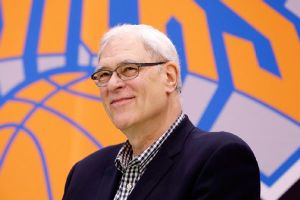 The New York Knicks are prioritizing cap space over winning and just about everything else.
The New York Knicks are prioritizing cap space over winning and just about everything else.
Stop me if you’ve heard this one before.
Team president Phil Jackson dealt Iman Shumpert and J.R. Smith to the Cleveland Cavaliers on Monday as part of a three-team trade that also included the Oklahoma City Thunder. The latter will receive Dion Waiters from the Cavaliers by way of a first-round pick. The Knicks, meanwhile, will receive three players—Lou Amundson, Alex Kirk and Lance Thomas—with non-guaranteed deals, at least two of which they’re expected to waive. They also arm themselves with two trade exceptions that can be used to absorb the contract of players in other deals.
This trade comes on the same day the Knicks waived Samuel Dalembert as well, a process Bleacher Report’s Howard Beck described:
Deal is mostly a salary purge for Knicks, who now could have about $27 mil in cap room this summer.
— Howard Beck (@HowardBeck) January 6, 2015
But Knicks, I'm told, had a second priority: culture change. Phil Jackson wanted JR Smith gone. Dalembert, too. Drags on the locker room.
— Howard Beck (@HowardBeck) January 6, 2015
That pretty much toes along the lines of what the Knicks themselves said on the heels of their manic Monday.
“As our journey moves through this season, we will search for the type of players that fit the style we hope to exhibit for our fans. Our desire is to improve our ability to compete,” Jackson said in a statement. “In addition, these transactions improve our flexibility to the current roster and the salary cap for future seasons.”
There’s no doubt this trade increases the Knicks’ financial plasticity moving forward. Smith held a player option for 2015-16 worth $6.4 million, while Shumpert was due for a new contract in restricted free agency and unlikely to return anyway. If he did return—again, unlikely—it would probably have been because he signed his qualifying offer worth $3.9 million. The Knicks, then, essentially guaranteed themselves up to $10.5 million of more wiggle room leading into this summer.
Carmelo Anthony, Pablo Prigioni, Jose Calderon, Cleanthony Early and Tim Hardaway Jr. are the only players under guaranteed contract beyond this season. If the Knicks bid farewell to everyone else—players like Travis Wear and Quincy Acy—they’ll have just $34.2 in committed salaries on their ledger. With the NBA’s salary cap projected to hit $66.5 million for next season, that gives the Knicks roughly $32.3 million in space before factoring in requisite cap holds and their first-round pick, the latter of which is exponentially more valuable given their sorry record and this talent-shedding trade. After cap holds and picks, they should be left with close to, or north of, $28 million.
But while that’s enough to sign a max free agent and another impact player—or perhaps a slew of impact players—the Knicks have been here before, clearing the same space, slinging the same ethos, chasing the same unicorn. They cleared their books of salary leading into summer 2010, the dream of landing two of LeBron James, Chris Bosh and Dwyane Wade alive and well. They struck out on all three, settling for Amar’e Stoudemire, before ultimately overpaying for Melo.
Something similar could happen again. You have to believe Jackson will be more judicious if he’s forced to explore contingency plans—he, unlike those Knicks, didn’t use first-round picks to offload cap-clogging deals—but nothing is guaranteed. Jackson did essentially deal prized assets like Tyson Chandler and Shumpert just to part ways with Ray Felton, after all.
There’s also no telling which free agents will actually be seduced by the Knicks given their present state. New York’s mystique isn’t enough on its own, as we saw in 2010. And while the Knicks admittedly didn’t have Melo or Jackson then, one could argue that, with talents like Danilo Gallinari, Timofey Mozgov and Wilson Chandler, they had the better foundation for something special.
Either way, it was all about the cap space, just like it is now. Jackson can say what he pleases about changing the culture. That is indeed the ultimate goal. Yet in order to get there, he’s traveling a familiar path, recycling previously used means that, while promising, have already failed the team he’s trying to save.
Dan Favale is a firm believer in the three-pointer as well as the notion that defense doesn’t always win championships. His musings can be found at Bleacherreport.com in addition to TheHoopDoctors.com.

















